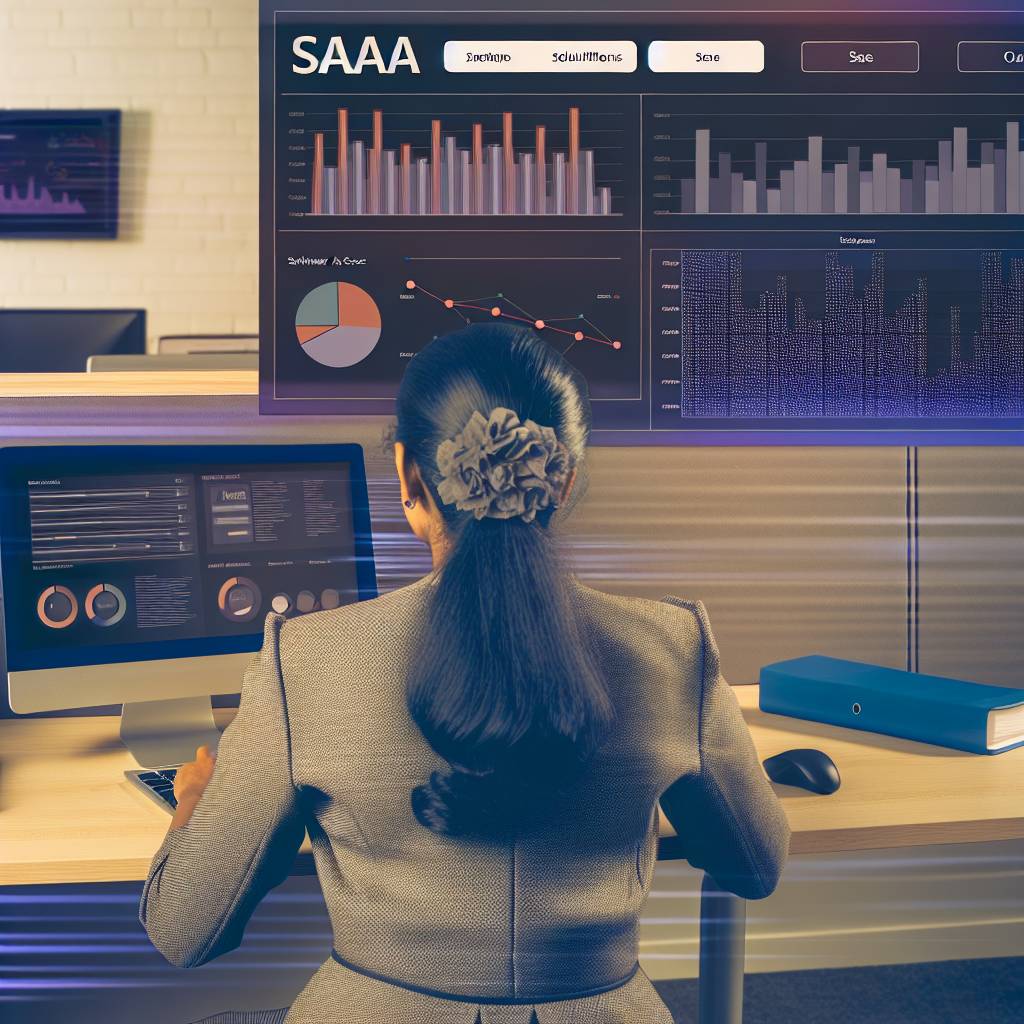Introduction
Let’s explore custom ERP solutions for retailer
Custom ERP Solutions
Custom ERP solutions are specialized software systems designed to streamline various business processes.
These solutions integrate different functions, such as inventory management, order processing, and financial accounting.
Overview of the importance of Supply Chain Management (SCM) in retail
Effective Supply Chain Management (SCM) is crucial for retailers, enhancing efficiency and responsiveness.
SCM involves the management of goods and services from suppliers to end customers.
Retailers face challenges such as demand fluctuations and inventory management, making SCM vital for success.
The benefits of a tailored ERP solution for retail supply chains
A tailored ERP solution for retailers provides numerous benefits that enhance supply chain performance.
It improves visibility across the supply chain, enabling real-time tracking of inventory levels.
Retailers can respond quickly to customer demands, reducing the risk of stockouts or overstocking.
Unlike generic systems, ERP solutions for retailer can be customized to address specific business needs, such as local supplier management or seasonal stock adjustments.
Additionally, custom ERP solutions for retailer facilitate better collaboration with suppliers and distributors.
Streamlined communication improves efficiency, reducing delays and minimizing errors within the supply chain.
These systems also simplify reporting and analytics, offering valuable insights into overall supply chain performance.
Data-driven decision-making empowers retailers to engage in more strategic planning and resource allocation.
In summary, ERP solutions for retailer are critical in optimizing supply chain operations.
They enhance operational efficiency, foster better supplier collaboration, and provide essential insights for long-term success.
Investing in these tailored solutions ensures that retailers can stay competitive in a rapidly evolving market.
Understanding Supply Chain Management
At its core, Supply Chain Management involves overseeing the flow of goods and services.
This management includes all processes that transform raw materials into final products.
It integrates various components to improve efficiency and reduce costs.
Key components of SCM in retail include:
- Sourcing: Identifying and working with suppliers to procure goods.
- Procurement: The process of acquiring goods and services needed for operations.
- Logistics: Managing the transportation and storage of products throughout the supply chain.
- Inventory Management: Keeping track of stock levels to ensure product availability without excessive surplus.
- Demand Planning: Forecasting customer demand to align supply with anticipated sales.
- Order Fulfillment: Completing customer orders accurately and efficiently.
These components are interdependent.
Effectively managing one area often influences the performance of others.
Therefore, retailers must adopt a holistic approach to their supply chains.
Challenges Faced by Retailers in Managing Supply Chains
Retailers encounter various challenges in SCM, which can hinder efficiency and profitability.
Some of these challenges include:
- Complexity: Managing multiple suppliers and logistics partners creates complexity. It makes coordination difficult and increases the possibility of errors.
- Demand Volatility: Customer demand shifts rapidly, complicating inventory management. This volatility makes accurate forecasting essential.
- Costs: Rising transportation and material costs place significant pressure on margins. Retailers need to identify cost-effective solutions.
- Technology Integration: Many retailers struggle with integrating new technologies into existing systems. This can create disruptions if not handled effectively.
- Regulatory Compliance: Changes in regulations can affect sourcing and logistics strategies. Retailers must remain compliant while minimizing disruption.
- Environmental Concerns: Increasing awareness of sustainability affects supply chain practices. Retailers face pressure to operate more sustainably.
These challenges require sound strategies and effective practices.
Addressing these issues ensures that retailers operate smoothly and efficiently.
The Impact of Effective SCM on Customer Satisfaction and Profitability
Retailers can significantly enhance customer satisfaction and profitability through effective Supply Chain Management.
When SCM functions well, it leads to numerous advantages.
First, effective SCM increases efficiency.
Streamlined processes reduce lead times, allowing retailers to deliver products faster.
This timeliness contributes to higher customer satisfaction.
Second, accurate demand forecasting and inventory management enhance product availability.
Customers will find the items they need in stores or online.
We Design & Develop Websites, Android & iOS Apps
Looking to transform your digital presence? We specialize in creating stunning websites and powerful mobile apps for Android and iOS. Let us bring your vision to life with innovative, tailored solutions!
Get Started TodayThis availability fosters loyalty and encourages repeat business.
Third, cost savings in the supply chain can translate to competitive pricing.
Retailers can pass on some savings to customers, making their offerings more attractive.
This improves market positioning against competitors.
Additionally, SCM contributes to risk management.
By diversifying suppliers and logistics partners, retailers can mitigate disruptions.
A resilient supply chain helps businesses adapt quickly to unforeseen circumstances.
Lastly, effective SCM can drive sustainability efforts.
Retailers that emphasize sustainability can appeal to environmentally conscious customers.
This alignment with consumer values can enhance brand reputation and market share.
The positive impact of effective SCM is clear.
Retailers that invest in solid supply chain strategies will often see significant returns in customer loyalty and profitability.
Understanding Supply Chain Management is crucial for retailers aspiring to thrive in a competitive marketplace.
Each component of SCM plays an essential role in the overall process.
Retailers must navigate various challenges to maintain efficiency.
Importantly, effective SCM directly influences customer satisfaction and profitability.
Retailers can enhance their operations by adopting a strategic approach to their supply chains.
Ultimately, successful SCM practices can set retailers apart in an increasingly complex landscape.
Read: Integrating Next-Gen Software in Luxury Business Strategies
Key Features of Custom ERP Solutions for Retail
ERP solutions for retailer offer numerous advantages for optimizing supply chain management.
These tailored systems address unique business challenges, ensuring a more efficient operation.
Key features of ERP solutions for retailer include:
- Customization: ERP solutions for retailer can be adapted to fit specific needs like seasonal stock adjustments and regional supplier management.
- Real-Time Visibility: With ERP solutions for retailer, businesses gain full visibility of inventory levels, enabling quicker responses to customer demands.
- Enhanced Collaboration: These systems streamline communication with suppliers and distributors, reducing delays and improving overall supply chain efficiency.
By leveraging these solutions, retailers can effectively manage their operations, ensuring sustained growth and competitive advantage.
Inventory Management Tools
Effective inventory management is crucial for retailers.
Custom ERP solutions provide advanced inventory management tools that enhance efficiency and accuracy.
These tools help retailers manage stock levels, track movements, and reduce excess inventory.
- Real-Time Tracking: Retailers can monitor inventory in real-time, ensuring accurate stock levels.
- Automated Reordering: Set thresholds for automatic reordering, preventing stockouts.
- Multi-Channel Management: Manage inventory across physical stores and online platforms seamlessly.
- ABC Analysis: Prioritize inventory management efforts based on item value and movement.
These features allow retailers to maintain optimal inventory levels while minimizing holding costs.
Accurate inventory data helps retailers make informed decisions on purchasing and sales strategies.
Demand Forecasting Capabilities
Understanding customer demand is critical to supply chain efficiency.
Custom ERP solutions include robust demand forecasting capabilities.
This feature enables retailers to predict future sales based on historical data and trends.
- Data-Driven Insights: Use data analytics to identify sales patterns and trends.
- Seasonal Adjustments: Adapt inventory levels based on seasonal demand fluctuations.
- Promotional Impact: Gauge the effect of marketing promotions on sales forecasts.
- Collaboration Tools: Enhance communication between sales, marketing, and inventory teams.
Employing accurate demand forecasting reduces waste and improves customer satisfaction.
It ensures that popular products are available while less popular items are minimized.
Ultimately, better forecasting leads to a more agile supply chain.
Real-Time Data Analytics and Reporting
Data is the backbone of modern retail operations.
We Design & Develop Websites, Android & iOS Apps
Looking to transform your digital presence? We specialize in creating stunning websites and powerful mobile apps for Android and iOS. Let us bring your vision to life with innovative, tailored solutions!
Get Started TodayCustom ERP solutions equip retailers with powerful real-time data analytics and reporting tools.
These features deliver immediate insights into various aspects of the business.
- Performance Dashboards: Gain an overview of key performance indicators (KPIs) in one place.
- Customization Options: Tailor reports to track specific metrics that align with business goals.
- Error Reduction: Automate reporting to minimize human error and improve accuracy.
- Historical Data Access: Leverage historical data for comprehensive analysis and planning.
With access to real-time data, retailers can make swift decisions.
They can respond to market changes, customer feedback, and operational issues promptly.
This ability to adapt enhances competitiveness in the retail landscape.
Integration with Existing Systems
Retailers often operate multiple systems for various functions.
Custom ERP solutions facilitate integration with existing systems.
This includes point-of-sale (POS) systems and e-commerce platforms.
- Smooth Transition: Migrate to a new ERP solution without disrupting current operations.
- Centralized Data: Consolidate data from various platforms into one system for ease of access
- Improved Coordination: Ensure that sales, inventory, and finance teams work from the same data.
- Streamlined Processes: Reduce redundancy and improve workflow efficiency across departments.
By integrating with existing systems, retailers create a seamless flow of information.
This integration fosters collaboration and drives better decision-making.
As a result, overall operational efficiency increases.
Custom ERP solutions offer essential features that help retailers optimize supply chain management.
Inventory management tools keep stock levels accurate.
Demand forecasting ensures that products meet customer needs effectively.
Real-time data analytics enable swift decision-making, while system integration enhances operational efficiency.
Investing in a custom ERP solution is a strategic move for retailers.
These systems provide the flexibility and functionality required to navigate the complexities of modern retail.
Embracing these technologies can lead to improved customer satisfaction and increased profitability.
Read: Why CEOs Should Invest in Blockchain Software for Future-Proof Business Operations
Benefits of Custom ERP Solutions for Retailers
Enhanced Visibility and Control Over Supply Chain Operations
ERP solutions for retailer provide significant visibility across their supply chains, enabling better decision-making.
With real-time data, managers can track inventory, shipments, and order statuses efficiently.
This transparency allows ERP solutions for retailer to support swift responses to demand changes or supply disruptions.
By monitoring every link in the supply chain, ERP solutions for retailer help reduce stockouts or overstock situations.
Improved visibility also strengthens supplier relationships.
Retailers can assess supplier performance, identifying reliable partners or those needing improvement.
With ERP solutions for retailer, companies can foster close collaboration with suppliers, negotiate better terms, and drive cost reductions, ultimately enhancing supply chain efficiency.
Improved Decision-Making Through Data Insights
Custom ERP solutions empower retailers to analyze vast amounts of data.
They can extract actionable insights that inform strategic decisions.
For instance, sales trends can indicate which products are performing best.
Retailers can then adjust procurement strategies to align with market demand.
Additionally, customized dashboards in ERP systems present critical data visually.
This simplifies complex information, making it easier to comprehend.
Retailers can track key performance indicators (KPIs) and metrics in real-time.
Decision-makers can utilize these insights to forecast sales, plan promotions, and allocate resources efficiently.
Furthermore, data-driven decisions can enhance customer satisfaction.
We Design & Develop Websites, Android & iOS Apps
Looking to transform your digital presence? We specialize in creating stunning websites and powerful mobile apps for Android and iOS. Let us bring your vision to life with innovative, tailored solutions!
Get Started TodayBy understanding purchasing patterns, retailers can tailor their offerings.
They can create personalized marketing campaigns, increasing customer loyalty.
In today’s competitive landscape, those who leverage data have a distinct advantage.
Cost-Effectiveness in Inventory Management and Procurement
Investing in custom ERP solutions often leads to significant cost savings.
By streamlining inventory management, retailers can reduce unnecessary expenses.
Effective inventory control minimizes excess stock, which ties up cash flow.
This ensures that resources are allocated efficiently and are ready to be utilized as needed.
Moreover, ERP solutions optimize procurement processes.
Retailers can automate purchasing tasks, such as order placements.
This decreases the risk of human errors and ensures timely deliveries.
Automation also enables better tracking of expenses related to procurement
Retailers can identify patterns and negotiate better deals with suppliers based on data.
Additionally, custom ERP systems can help manage seasonal fluctuations in inventory.
Retailers can adjust orders based on historical sales data and forecasts.
This proactive approach reduces the likelihood of overstocking during slow seasons.
Ultimately, the result is a more efficient operational model and increased profitability.
Increased Efficiency Through Automation
Custom ERP solutions offer significant benefits to retailers, particularly through automation.
Automating processes frees up employee time for strategic initiatives.
Retailers can automate manual tasks such as:
- Data Entry: Streamline repetitive tasks and reduce errors caused by manual input.
- Order Processing: Ensure timely and accurate order fulfillment to enhance customer satisfaction.
- Report Generation: Automate reporting to provide real-time insights and improve decision-making.
Automation improves accuracy across supply chain operations, reducing the potential for human errors.
Accurate data ensures all departments work from the same information, promoting alignment and collaboration.
Additionally, retailers can set up automated:
- Alerts and Notifications: Proactively manage reorders, inventory counts, and shipment tracking with real-time alerts.
- Scalability: As businesses grow, custom ERP solutions adapt to larger volumes of transactions and inventory.
The flexibility of custom ERP solutions allows retailers to add new modules as needed, supporting their growth.
These systems improve visibility and control over supply chain operations, driving better decision-making through advanced data insights.
Retailers benefit from
- Cost-Effectiveness: Optimized inventory management and procurement practices save money and enhance financial performance.
- Increased Efficiency: Automating time-consuming manual tasks lets employees focus on critical business aspects.
In a fast-changing market, retailers cannot afford inefficiencies.
Implementing custom ERP solutions positions them to respond quickly to market changes and customer preferences.
This investment enhances their competitive edge, ensuring long-term success.
By tailoring their ERP systems, retailers optimize supply chain management and secure their business’s future.
Read: Leveraging Cloud-Based Analytics Software for Healthcare to Enhance Patient Data Security

Customization vs. Off-the-Shelf ERP Solutions
When it comes to selecting an ERP solution for retailers, businesses often face a critical decision: whether to choose a custom solution or an off-the-shelf option.
Understanding the key differences between these two types of ERP systems is paramount for optimizing supply chain management.
Below, we will explore these differences, the benefits of customization for retailers, and the potential drawbacks of generic ERP solutions.
Differences Between Custom and Off-the-Shelf ERP Systems
Choosing between a custom ERP solution and an off-the-shelf option requires understanding their fundamental differences.
Here are the main distinctions:
We Design & Develop Websites, Android & iOS Apps
Looking to transform your digital presence? We specialize in creating stunning websites and powerful mobile apps for Android and iOS. Let us bring your vision to life with innovative, tailored solutions!
Get Started Today- Development Approach: Custom ERP solutions are developed specifically for a company’s unique needs. Off-the-shelf solutions are prepackaged software designed for a broad audience.
- Flexibility: Custom ERPs can be tailored to meet specific business processes. Off-the-shelf systems often come with standard features that may be less flexible.
- Integration Capabilities: Custom solutions allow for seamless integration with existing systems. Off-the-shelf solutions may require additional customization for integration.
- Implementation Time: Custom ERP takes longer to implement due to its development phase. Off-the-shelf systems typically offer faster deployment.
- Cost: Custom solutions often require a higher initial investment. Off-the-shelf systems generally have lower upfront costs.
- User Experience: Custom solutions are designed with user preferences in mind. Off-the-shelf systems may offer a more generic user experience.
Advantages of Customization for Retailers
Custom ERP solutions offer numerous advantages for retailers, specifically in supply chain management.
These advantages include:
- Specific Needs: Custom ERPs allow retailers to address their specific operational requirements. This leads to improved efficiency and effectiveness in supply chain processes.
- Scalability: Tailored solutions grow alongside the business. Retailers can modify their systems easily as their operation expands or shifts.
- Unique Workflow Integration: Custom solutions integrate unique workflows seamlessly. This reduces friction and speeds up processes within the supply chain.
- Enhanced Reporting and Analytics: Custom ERPs enable the creation of tailored reports. This helps retailers make informed decisions based on precise data.
- Competitive Advantage: Having a customized solution provides a competitive edge. It allows retailers to implement unique processes not available to competitors.
- Better User Adoption: Custom solutions cater to the needs of the users. This fosters higher satisfaction and encourages user adoption across the organization.
Potential Drawbacks of Generic ERP Solutions for Retail SCM
While off-the-shelf ERP systems can offer advantages, they also come with potential drawbacks that retailers should consider:
- Limited Customization: Generic solutions often limit the ability to customize. Retailers may have to adapt their processes to fit the system.
- Standard Features may Lack Functionality: Off-the-shelf systems might not possess all necessary features. This lack of fit can hinder effective supply chain management.
- Integration Issues: Generic ERP solutions may struggle to Integrate with existing tools. This can create data silos and disrupt overall operations.
- Long-term Costs: Although cheaper upfront, off-the-shelf systems can incur higher costs over time. Ongoing licensing fees and missed efficiencies can add up.
- Inflexibility: Retailers may find it challenging to make changes to an off-the-shelf ERP. This inflexibility can hinder adaption to new market conditions.
- Less Support for Specific Industries: Generic ERP solutions may not cater to niche retail markets effectively. This can lead to decreased productivity and missed opportunities.
Furthermore, the choice between a custom ERP solution and an off-the-shelf option comes down to the specific needs and circumstances of the retailer.
Custom solutions offer tailored functionalities that can enhance various aspects of supply chain management.
On the other hand, off-the-shelf systems may provide quicker and lower-cost implementation but often lack the flexibility retailers need.
Therefore, retailers must carefully evaluate their operational requirements and future growth plans.
Understanding both options will enable them to make a well-informed decision that aligns with their goals.
In today’s dynamic retail landscape, adjusting rapidly to changes is crucial.
Thus, choosing the right ERP solution is not just an IT decision; it’s a strategic business choice.
Read: Cutting-Edge Digital Platforms for Exclusive Client Management
Case Studies of Successful Custom ERP Implementations in Retail
Understanding how businesses benefit from custom ERP solutions in real-world scenarios provides great insight.
Below, we explore several case studies that demonstrate successful implementations of custom ERP systems in retail environments.
Each example showcases the challenges faced before implementation, the solutions provided, and the quantifiable results achieved post-implementation.
Case Study 1: Global Sporting Goods Retailer
One of the largest sporting goods retailers faced significant challenges with supply chain visibility.
Inventory discrepancies led to product shortages and excess stock, which ultimately affected customer satisfaction.
Challenges Before Implementation
- Lack of real-time inventory tracking across locations.
- Inefficient communication between suppliers and stores.
- Inability to analyze sales data effectively.
Solutions Provided
The company decided to implement a custom ERP solution that integrated all aspects of supply chain management.
This solution enabled better tracking of inventory levels across multiple locations in real-time.
Enhanced reporting capabilities allowed the retailer to analyze sales data and forecast demand accurately.
Quantifiable Results Post-Implementation
- Reduced inventory discrepancies by 30% within six months.
- Improved lead times for product replenishment by 25%.
- Increased overall customer satisfaction ratings by 20%.
Case Study 2: Fashion Retail Chain
A well-known fashion retailer struggled with seasonal inventory management.
They regularly faced issues with overstocking winter clothes while understocking summer collections.
Challenges Before Implementation
- Inflexible inventory management processes.
- High markdowns due to unsold seasonal products.
- Delayed decisions based on outdated sales reports.
Solutions Provided
The retailer implemented a custom ERP solution designed specifically for fashion retailers.
The system offered configurable inventory management tools that adjusted to seasonal trends.
It provided timely reports and dashboard views to assist in strategic decision-making.
Quantifiable Results Post-Implementation
- Reduced inventory holding costs by 15% year-over-year.
- Decreased markdowns on seasonal products by 40%.
- Improved sales forecasting accuracy by 35%.
Case Study 3: Grocery Store Chain
A large grocery chain dealt with complex supplier relationships and perishability of products, which complicated inventory management.
They often lost sales due to stockouts.
Challenges Before Implementation
- Difficulties in tracking perishable inventory.
- Inadequate supplier communication leading to delays.
- Lack of insights into product performance.
Solutions Provided
The grocery chain opted for a custom ERP system focused on perishability and supplier relationship management.
The customization allowed them to monitor product life cycles and communicate efficiently with suppliers.
They gained insights into items with rapid turnover, helping them manage stock levels more effectively.
Quantifiable Results Post-Implementation
- Reduced spoilage costs by 50% in the first year.
- Increased supplier fulfillment rates to 95%.
- Enhanced customer satisfaction scores by 30%.
Case Study 4: Electronics Retailer
A major electronics retailer faced significant issues with customer returns.
The complexity of managing inventory for multiple brands and products added to the challenge.
Challenges Before Implementation
- Difficulty in tracking warranty claims and returns.
- Inaccurate inventory levels leading to inefficient stock orders
. - High return rates impacting profits and customer trust.
Solutions Provided
The company implemented a custom ERP solution that integrated return management with inventory control.
The system enabled better tracking of warranty claims and provided insights into return reasons.
This helped streamline the overall process and identify trends affecting inventory.
Quantifiable Results Post-Implementation
- Reduced return processing time by 60%.
- Decreased return rates by 25% within the first year.
- Increased profit margins by 15% as a result of improved inventory management.
Final Thoughts
Custom ERP implementations have demonstrably improved supply chain management for many retailers.
We Design & Develop Websites, Android & iOS Apps
Looking to transform your digital presence? We specialize in creating stunning websites and powerful mobile apps for Android and iOS. Let us bring your vision to life with innovative, tailored solutions!
Get Started TodayEach case study illustrates significant progressed outcomes due to tailored solutions.
By overcoming initial challenges and realizing quantifiable benefits, retailers position themselves for long-term success in a competitive landscape.
Investing in a custom ERP solution can empower retailers to optimize their supply chains for better efficiency, profitability, and customer satisfaction.
Steps to Implement a Custom ERP Solution Successfully
Implementing a custom ERP solution in the retail industry is a strategic move
Retailers can enhance their supply chain management by optimizing processes and increasing efficiency.
Successful implementation requires careful planning and execution.
Follow these steps for effective implementation.
Conducting a Needs Assessment to Identify Specific Requirements
The first step involves a comprehensive needs assessment.
This will ensure the custom ERP solution aligns with your business goals.
Here are key elements to focus on:
- Stakeholder Engagement: Involve all relevant stakeholders to gather insights.
- Gap Analysis: Identify inefficiencies in current supply chain processes.
- Requirement Mapping: Define specific features and functionalities needed.
- Scalability Needs: Consider future growth and integration with existing systems.
- Compliance and Regulatory Standards: Address any industry-specific requirements.
A thorough assessment allows organizations to pinpoint their unique needs and challenges.
This information forms the foundation for a successful ERP system.
Selecting the Right ERP Vendor and Development Team
Choosing the right vendor is crucial for ERP success.
The right partner will understand your business requirements deeply.
Consider the following steps when selecting a vendor:
- Vendor Reputation: Research and analyze potential vendors’ market presence.
- Experience in Retail: Ensure the vendor has experience with retail ERP systems.
- Technical Expertise: Evaluate the skills and knowledge of the development team.
- Customization Capabilities: Check the vendor’s ability to provide tailored solutions.
- Post-Implementation Support: Assess the vendor’s ongoing support and training offerings.
A reputable vendor builds a strong foundation for the ERP project.
Their expertise helps navigate challenges that arise during implementation.
Phased Rollout and Testing Procedures
A phased rollout is essential for minimizing disruption during implementation.
It enables retailers to evaluate the system’s effectiveness gradually.
Follow these steps for a successful rollout:
- Pilot Testing: Start with a limited functional area or location to pilot the system.
- User Training: Provide thorough training to all employees involved in the pilot.
- Gather User Feedback: Collect insights from users to identify areas for improvement.
- Iterate: Make necessary adjustments based on feedback before the full rollout.
- Full Implementation: Gradually expand the system to other areas of the business.
Implementing the ERP system in phases allows for manageable adjustments.
This approach reduces resistance and fosters user acceptance.
Ongoing Support and System Updates Post-Implementation
After the initial implementation phase, ongoing support is critical.
Retailers must ensure that the system continues to meet evolving needs.
Focus on the following areas:
- Technical Support: Provide continuous tech support for users facing issues.
- Regular System Updates: Schedule periodic updates to enhance system functionality.
- Performance Monitoring: Utilize key performance indicators to assess ERP effectiveness.
- Feedback Mechanism: Establish channels for users to report issues and suggest improvements.
- Training Programs: Offer ongoing training to keep staff updated on new features.
Ongoing support reinforces the system’s reliability and encourages exploration of new features.
Regular updates help the ERP adapt to market changes.
Implementing a custom ERP solution requires a well-organized approach.
By conducting a needs assessment, selecting the right vendor, executing a phased rollout, and ensuring ongoing support, retailers can transform their supply chain management.
Investing time and resources in these steps ultimately leads to enhanced operational efficiency and sustained growth.
Future Trends in Custom ERP Solutions for Retail Supply Chains
As retailers evolve, they must adapt their supply chain management practices.
Custom ERP solutions play a vital role in this evolution.
The future of these systems looks promising.
Retailers need to integrate advanced technologies.
This integration will enhance efficiency and responsiveness in supply chains.
We Design & Develop Websites, Android & iOS Apps
Looking to transform your digital presence? We specialize in creating stunning websites and powerful mobile apps for Android and iOS. Let us bring your vision to life with innovative, tailored solutions!
Get Started TodayThe Growing Role of AI and Machine Learning in SCM
AI and machine learning are transforming supply chain management.
These technologies help retailers analyze vast amounts of data.
They can predict demand fluctuations with remarkable accuracy.
Retailers can use these insights to streamline operations.
- AI algorithms analyze purchasing patterns.
- Machine learning tracks seasonal trends.
- Predictive analytics enables proactive inventory management.
By harnessing AI, retailers can automate routine tasks.
This automation increases efficiency and reduces human error.
For instance, AI can manage stock replenishment.
The system can alert teams when levels drop below a threshold.
Moreover, AI enhances forecasting capabilities.
With detailed analytics, retailers can avoid overstocking and stockouts.
This leads to improved customer satisfaction and reduced waste.
These factors directly impact profit margins positively.
The Impact of IoT on Supply Chain Visibility and Efficiency
The Internet of Things (IoT) is revolutionizing supply chain operations.
Connected devices offer real-time data on inventory and shipments.
This visibility allows retailers to monitor every aspect of their supply chains.
- IoT sensors track products during transit.
- Connected warehouses facilitate better resource allocation.
- Smart shelves alert managers when stock runs low.
By implementing IoT technologies, retailers can react swiftly to unexpected situations.
For example, if a delivery delays, the system notifies relevant stakeholders.
This communication allows teams to adjust their strategies in real time.
Additionally, IoT enhances maintenance management.
Sensors can signal when equipment requires servicing.
This predictive maintenance minimizes downtime and maximizes productivity.
Cost savings accumulate as maintenance becomes more efficient.
Anticipating Shifts in Consumer Behavior and the Need for Agile Supply Chain Systems
Consumer behavior continues to evolve rapidly.
Retailers must understand these shifts to thrive.
Custom ERP solutions help analyze changing consumer preferences.
They enable retailers to adapt their supply chain strategies promptly.
- Customer demand varies seasonally and geographically.
- Retailers must offer personalized experiences.
- Online shopping trends require agile fulfillment processes.
Agile supply chain systems provide the flexibility needed to respond.
Such systems can quickly adjust production schedules and logistics strategies.
Retailers can effectively manage these dynamics.
This responsiveness reduces lead times and improves service levels.
The customization aspect of ERP solutions also matters significantly.
Retailers can tailor functionalities to fit specific needs.
These customizations may include user interfaces and reporting capabilities.
This personal touch enhances usability across teams.
Embracing Sustainability and Ethical Sourcing
Today’s consumers prioritize sustainability.
We Design & Develop Websites, Android & iOS Apps
Looking to transform your digital presence? We specialize in creating stunning websites and powerful mobile apps for Android and iOS. Let us bring your vision to life with innovative, tailored solutions!
Get Started TodayRetailers must build sustainable supply chains.
Custom ERP solutions can help track sustainability metrics within the supply chain.
- ERP systems can monitor sourcing practices for ethical standards.
- Tracking carbon footprints becomes integral to supply chain design.
- Efficiently managing waste can lead to cost and resource savings.
ERP solutions for retailer enable seamless collaboration with suppliers, fostering accountability in sourcing.
Through ERP solutions for retailer, businesses can ensure suppliers adhere to sustainable practices, aligning with eco-conscious values.
By integrating sustainability goals within their supply chains, ERP solutions for retailer help companies position themselves favorably in the marketplace.
This not only attracts consumers who prioritize sustainability but also strengthens customer loyalty and enhances the brand image.
Ultimately, ERP solutions for retailer serve as a crucial tool in advancing both operational efficiency and sustainability initiatives.
The Future of Customization in ERP Solutions
The demand for tailored solutions will only increase.
Retailers seek systems that align specifically with their business models.
Custom ERP solutions can offer this level of personalization.
- Retailers can prioritize features based on operational needs
. - Integrating third-party applications enhances functionality.
- Flexible modules allow businesses to scale their systems easily.
Such developments facilitate dynamic adjustments.
As businesses grow, their ERP solutions can evolve without major disruptions.
Furthermore, upgrading specific modules becomes streamlined.
This makes long-term planning simpler and more efficient.
Integration with Blockchain Technology
Blockchain technology is gaining traction in supply chain management.
Its decentralized structure enhances transparency and security.
Retailers can use blockchain for tracking goods from production to shelf.
- Immutable records increase accountability among supply chain participants.
- Consumers can verify product origins quickly.
- Smart contracts automate transactions and reduce administrative overhead.
With improved traceability, retailers gain customer trust.
They can assure clients of product authenticity.
This trust is crucial in fostering brand loyalty in a competitive marketplace.
In summary, custom ERP solutions for retailer are evolving rapidly.
AI, IoT, and agile methodologies are becoming essential.
Sustainability and ethical sourcing are rising in priority, prompting suppliers and retailers to adapt.
Future trends emphasize flexibility, transparency, and consumer-centric approaches.
Retailers that embrace these changes in their supply chains will thrive in the years ahead.
Conclusion
Recap the significance of adopting custom ERP solutions in optimizing retail supply chains
Adopting custom ERP solutions significantly enhances supply chain optimization for retailers.
These tailored systems streamline processes and eliminate inefficiencies.
Retailers can improve inventory management by leveraging real-time data.
This leads to better demand forecasting and reduced stockouts.
Moreover, custom ERP solutions provide advanced analytics capabilities.
Retailers can track performance metrics and analyze consumer behavior.
Such insights enable informed decision-making and strategic planning.
Over time, these improvements result in cost savings and increased profitability.
Encouragement for retailers to consider tailored solutions for better SCM
We encourage retailers to consider bespoke ERP solutions tailored to their unique needs.
Off-the-shelf systems may not address specific challenges effectively
We Design & Develop Websites, Android & iOS Apps
Looking to transform your digital presence? We specialize in creating stunning websites and powerful mobile apps for Android and iOS. Let us bring your vision to life with innovative, tailored solutions!
Get Started TodayA customized approach ensures that solutions align with a retailer’s operations and goals.
Retailers willing to invest in tailored technology can gain a competitive edge.
Final thoughts on the future of retail supply chain management through technology
Lastly, the future of retail supply chain management hinges on technology and innovation.
As trends shift, retailers must adapt to remain relevant.
The integration of AI, machine learning, and IoT into ERPs offers immense potential.
These advancements promise even greater efficiency in supply chain operations.
Embracing custom ERP solutions transforms retail supply chain management.
Retailers enhance visibility, improve efficiency, and optimize performance.
With technology continually evolving, the potential for future growth is boundless.
Before You Go…
Hey, thank you for reading this blog post to the end. I hope it was helpful. Let me tell you a little bit about Nicholas Idoko Technologies.
We help businesses and companies build an online presence by developing web, mobile, desktop, and blockchain applications.
We also help aspiring software developers and programmers learn the skills they need to have a successful career.
Take your first step to becoming a programming expert by joining our Learn To Code academy today!
Be sure to contact us if you need more information or have any questions! We are readily available.
Put Your Tech Company on the Map!
Get featured on Nicholas Idoko’s Blog for just $200. Showcase your business, boost credibility, and reach a growing audience eager for tech solutions.
Publish Now








